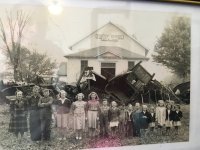ultrarunner
Epic Contributor
- Joined
- Apr 6, 2004
- Messages
- 29,061
- Tractor
- Cat D3, Deere 110 TLB, Kubota BX23 and L3800 and RTV900 with restored 1948 Deere M, 1949 Farmall Cub, 1953 Ford Jubliee and 1957 Ford 740 Row Crop, Craftsman Mower, Deere 350C Dozer 50 assorted vehicles from 1905 to 2006
Paper Drives helped fund Scouting and 4 times a year we collected. Twenty Dollars a ton...
Have not seen a paper drive or collection in decades but few take the paper anymore.
Mom still does... but it keeps getting smaller and smaller.
They must have done a special run after election because her neighborhood was blanketed with every house getting Headline Trump defeated... some are still in the driveways.
Have not seen a paper drive or collection in decades but few take the paper anymore.
Mom still does... but it keeps getting smaller and smaller.
They must have done a special run after election because her neighborhood was blanketed with every house getting Headline Trump defeated... some are still in the driveways.

